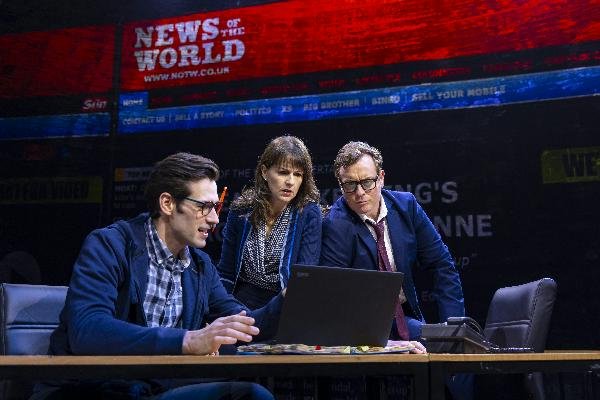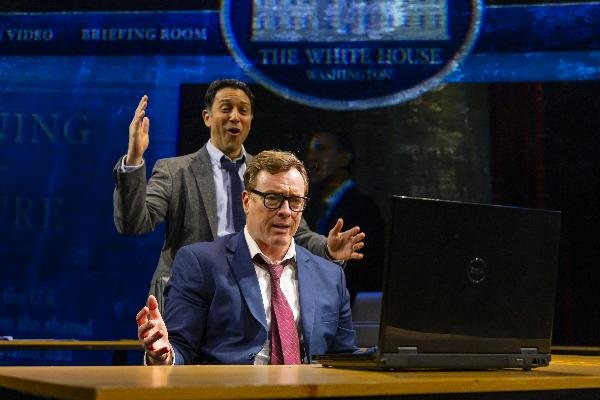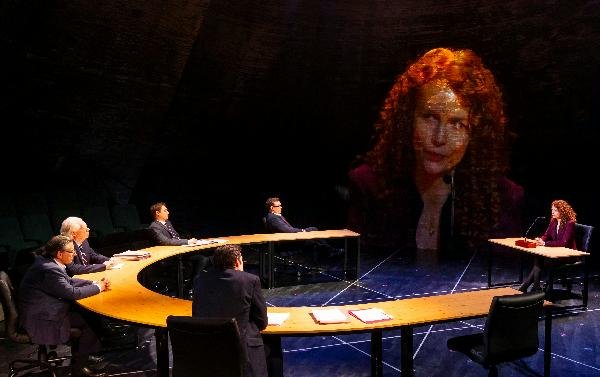Off-Broadway Review: "Corruption"
The show: “Corruption” by J.T. Rogers at Lincoln Center’s Mitzi E. Newhouse Theatre
What makes it special?: It’s a new play by the playwright who brought us “Oslo.” Also making it special is its provocative subject matter: A look inside Rupert Murdoch’s newspaper empire during its phone-hacking scandal a decade ago.
What’s it about?: What made “Oslo” so impactful for many — though I was not a big fan of the work — was its big-picture sweep of historical events and its clear telling of that story and its personalities. That play was about the 1993 peace accords between Israel and the PLO. Here Rogers attempts a similar behind-the-scenes strategy about Murdoch’s empire and the changing world of the media — but with less than riveting results over an unengaging run of nearly three hours.
One of the principal characters in the play is tough-as-nails editor Rebekah Brooks. At the play’s start, she is named the new chief executive of News International, the Murdoch-owned British newspaper group and she is fiercely determined to make corporation’s newspapers profitable and relevant, in the face of those who proclaim that industry as dying. But no hero she, especially when she knows all to well that what’s at stake is a lucrative television deal that Murdoch is desperate for the British government to approve
The narrative is propelled when it is revealed that one of Murdoch’s newspapers — the very popular tabloid News of the World — clandestinely acquired thousands of voice mail messages of politicians, celebs, and even regular folk, too; that is, when they become part of a tantalizing news story. One such person was a missing 13-year-old girl who was later found dead, and it is on that particular revelation that gives the case against the newspaper traction.
The play deals with corruption in high places, cover-ups by the police, corporate power struggles and personality clashes of powerful people in politics and big business. But “Succession” it isn’t.
The themes are certainly potent and the stakes certainly are high — democracy, the future of a free press, privacy issues, among them. But the characters here are thinly drawn, actions are outlines, scenes are rushed forward, and pronouncements are preachy. Ultimately one feels that this story would make for a far more effective documentary or mini-series, where one doesn't have to be submitted to banal or melodramatic dialogue or to deal with a barrage of information presented in awkward ways.
How is Rupert Murdoch portrayed?: Though he is often mentioned, that character never appears on stage, though one of his sons, James, does. Still, the media oligarch’s off-stage presence looms large, and is clearly involved in some of the plot’s developments.
Instead, the good-guy, under-dog protagonist here is Tom Watson, played with rumpled charm by Toby Stephens. Watson is a Labour member of Parliament who attempts to bring Murdoch down when an investigative reporter (Sanjit De Silva, perfect from this journalist’s eyes) informs him of information that suggests a vast network of corruption in one of Murdoch’s newspapers. The hunt is then on to get the goods on Brooks’ morally bankrupt efforts to boost newspaper sales at any cost.
Despite Bartlett Sher’s fast-paced direction, the avalanche of projections by 59 Productions and several fine performances, the play fails to engage in human terms. When it does try to make things a bit more personal for the characters, the efforts seem lame, clunky or just tacked on. It’s a broad brush play with unfortunately one broad-brush performance in Saffron Burrows as Brooks. If she had a mustache, she would be twirling it.
Michael Siberry, however, gives a deliciously dry performance as a wealthy one-time target of Murdoch’s newspapers who is happy to fund Watson’s investigation. Dylan Baker also does well in two roles; nicely playing variations of privileged evil.
Who will like it?: Perhaps die-hard journo-junkies, grateful for any exposure of the corrupt manipulations by media giants.
Who won’t?: Those wanting some substance beyond the headlines.
For the kids?: Probably not. What’s a newspaper?








